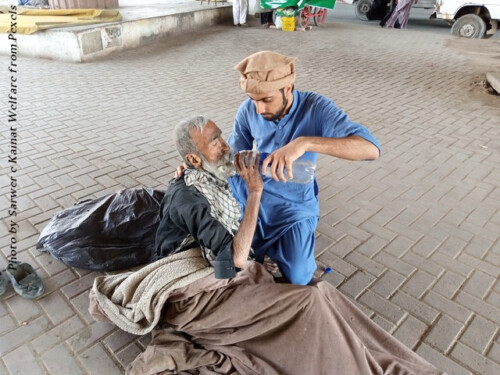The Healing Power of Helping: How Assisting Those in Need Benefits Your Mental and Physical Health
By Editorial Team
Helping people in need, whether through acts of kindness, volunteer work, or charitable endeavors, has profound positive effects on an individual’s mental and physical well-being. While the act of helping others is often framed as a selfless gesture, it also offers significant personal benefits. In this article, we will explore the ways in which assisting those in need can enhance one’s mental health and, in turn, promote physical well-being.
Mental Health Benefits of Helping People in Need:
- Increased Sense of Purpose:
- Helping others can provide a strong sense of purpose, fostering a feeling that one’s actions are meaningful and impactful. This purpose can combat feelings of aimlessness and existential distress, promoting mental well-being.
- Enhanced Self-Esteem and Self-Worth:
- Acts of kindness and assistance can boost self-esteem and self-worth. Knowing that you have made a positive difference in someone’s life can lead to a sense of accomplishment and increased self-confidence.
- Reduced Stress and Anxiety:
- Helping others has been linked to a reduction in stress and anxiety. Engaging in acts of kindness can trigger the release of hormones like oxytocin and endorphins, which promote feelings of well-being and calm.
- Improved Mood and Emotional Resilience:
- Volunteering or assisting those in need often leads to an improvement in mood and emotional resilience. It can buffer against symptoms of depression and increase overall emotional stability.
- Social Connection and Support:
- Acts of kindness foster social connections and a sense of belonging. Interacting with a community of like-minded individuals who share a commitment to helping can provide a valuable support network.
Physical Health Benefits of Helping People in Need:
- Lower Blood Pressure:
- Engaging in prosocial activities like volunteering has been associated with lower blood pressure. Reduced blood pressure contributes to a lower risk of cardiovascular disease and stroke.
- Strengthened Immune System:
- Acts of kindness and altruism can boost the immune system. A stronger immune system helps the body fight off infections and illnesses more effectively.
- Increased Longevity:
- Several studies suggest that individuals who engage in helping behaviors tend to live longer. This may be due to the combined effects of reduced stress, social support, and overall well-being.
- Pain Reduction:
- Engaging in acts of kindness can trigger the release of endorphins, which act as natural painkillers. This can lead to a reduction in chronic pain and discomfort.
- Better Sleep:
- Helping others can lead to improved sleep quality. Reduced stress and a sense of purpose can contribute to a more restful night’s sleep.
Conclusion: Helping people in need is a profoundly beneficial endeavor, not only for those receiving assistance but also for the individuals providing it. By enhancing mental health through increased purpose, reduced stress, and emotional well-being, acts of kindness indirectly promote physical health. Lower blood pressure, a stronger immune system, increased longevity, and other physical health benefits are all outcomes of these positive actions. Thus, the act of helping is a powerful tool for improving both mental and physical well-being, creating a virtuous cycle of health and happiness.

